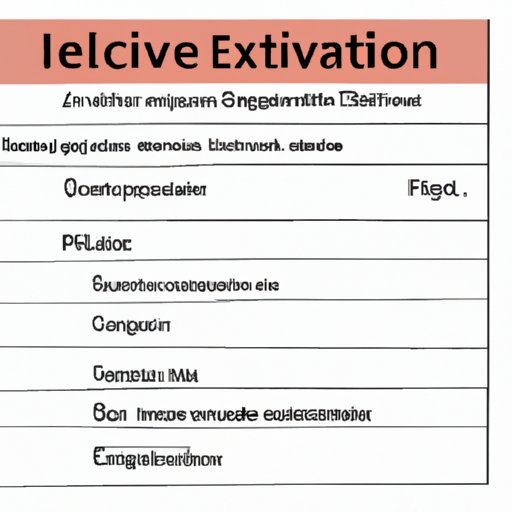Introduction
A notice to vacate is a document issued by a landlord or other property owner to a tenant that states that the tenant must leave the property within a certain period of time. It is usually used in cases where the tenant has failed to meet the terms of their rental agreement or if the landlord wants to terminate the lease early. In this article, we will explore the legal implications and consequences of a notice to vacate, as well as state laws related to a notice to vacate, common questions and answers, and tips for negotiating.
Exploring the Legal Implications of a Notice to Vacate
When a tenant receives a notice to vacate, it is important to understand the legal implications of such a document. The legal meaning of a notice to vacate is that the tenant must move out of the property within the specified time frame. If they fail to do so, they may be subject to legal action. It is also important to note that the notice to vacate is not a legally binding document, but rather an indication that the landlord or property owner wishes the tenant to leave the premises.
The consequences of not responding to a notice to vacate vary depending on the situation. Generally, if the tenant fails to move out of the property within the specified time frame, the landlord can take legal action against them. This could include filing an eviction lawsuit, which would require the tenant to appear in court and potentially face a monetary judgment against them. In some cases, the landlord may even be able to take possession of the property without going through the court process.
Each state has its own laws related to notices to vacate. These laws may vary slightly from state to state, so it is important to familiarize yourself with the specific laws in your area before responding to a notice to vacate. Additionally, some states have additional protections for tenants, such as requiring landlords to give more notice before evicting a tenant or providing a grace period before evicting a tenant.

Analyzing the Consequences of Not Responding to a Notice to Vacate
If a tenant fails to respond to a notice to vacate, they may be subject to several different legal consequences. Depending on the situation, the landlord may be able to file an eviction lawsuit against the tenant, which could result in a monetary judgment and/or an order for the tenant to move out of the property. Additionally, the tenant may be subject to late fees or other penalties for failing to move out on time.
In order to avoid potential legal trouble, it is important for tenants to respond to a notice to vacate in a timely manner and to follow all instructions given by the landlord or property owner. Additionally, tenants should make sure to read and understand the terms of their rental agreement before signing it, as this can help prevent misunderstandings between the tenant and the landlord.
Breaking Down State Laws Related to a Notice to Vacate
As mentioned above, each state has its own laws related to notices to vacate. In general, these laws outline the amount of notice required before a tenant must move out, as well as any restrictions on when a landlord can issue a notice to vacate. Additionally, some states have additional protections for tenants, such as requiring landlords to give more notice before evicting a tenant or providing a grace period before evicting a tenant.
It is important to compare and contrast different state laws in order to ensure that you are complying with the law in your area. Additionally, it is important to familiarize yourself with local ordinances, as these may provide additional protections for tenants. Finally, it is important to consult an attorney if you have any questions about your rights as a tenant.

Common Questions and Answers About a Notice to Vacate
When it comes to notices to vacate, there are many common questions and misunderstandings. One of the most common questions is how much notice must be given before a tenant must move out. Generally, the amount of notice required depends on state law, as well as the terms of the rental agreement. Additionally, it is important to note that the landlord cannot evict a tenant without first giving the tenant proper written notice.
Another common misunderstanding is that a notice to vacate automatically terminates the lease. However, this is not always the case. In some situations, the tenant may be able to negotiate a new lease with the landlord or work out a payment plan to stay in the property. Additionally, some states have laws that allow tenants to remain in the property until the end of the lease term if the landlord does not follow the proper legal procedures for terminating a lease.

Understanding the Timeline for a Notice to Vacate
Once a tenant receives a notice to vacate, it is important to understand the timeline for moving out. Generally, the tenant must move out within the specified time frame or risk being subject to legal action. Additionally, it is important to note that the tenant must move out completely, meaning that they must remove all of their personal belongings from the property.
If the tenant fails to move out within the specified time frame, the landlord may be able to take legal action against them. This could include filing an eviction lawsuit, which would require the tenant to appear in court and potentially face a monetary judgment against them. Additionally, the landlord may be able to take possession of the property without going through the court process.
Tips for Negotiating a Notice to Vacate
When negotiating a notice to vacate, it is important for the tenant to take steps to ensure the best possible outcome. First, the tenant should review the terms of their rental agreement to make sure that the landlord is following the correct legal procedures for terminating the lease. Additionally, the tenant should contact the landlord to discuss their options, such as negotiating a new lease or working out a payment plan to stay in the property.
It is also important for the tenant to be aware of their rights under state law. Some states have additional protections for tenants, such as requiring landlords to give more notice before evicting a tenant or providing a grace period before evicting a tenant. Additionally, the tenant should consider consulting an attorney if they have any questions about their rights as a tenant.
Conclusion
In conclusion, a notice to vacate is a document issued by a landlord or other property owner to a tenant that states that the tenant must leave the property within a certain period of time. It is important to understand the legal implications and consequences of a notice to vacate, as well as state laws related to a notice to vacate, common questions and answers, and tips for negotiating. By understanding the legal implications and taking steps to negotiate the best possible outcome, tenants can ensure that they are protected and that their rights are respected.
We hope this article has been informative and helpful in understanding what does notice to vacate mean. If you have any further questions or concerns, please contact a qualified attorney for advice.
(Note: Is this article not meeting your expectations? Do you have knowledge or insights to share? Unlock new opportunities and expand your reach by joining our authors team. Click Registration to join us and share your expertise with our readers.)
